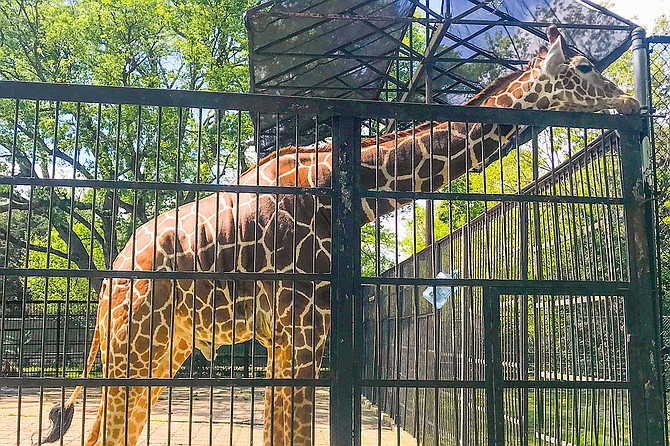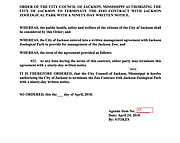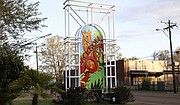Seven animals at the Jackson Zoo belong to the City of Jackson, and four of them are out on loan. K.D. Knox the giraffe, pictured above, belongs to the Jackson Zoological Society. It also has a spider monkey named Debbie. Photo by Ko Bragg
JACKSON — Jackson City Council President Charles Tillman of Ward 5 asked the members to use diplomacy during a conversation about the Jackson Zoo at last week's meeting. Not everyone took that to heart as the discussion turned both humorous and tense.
Ward 3 Councilman Kenneth Stokes placed an item on the April 24 council agenda to terminate the contract with the Jackson Zoo in about 90 days in the wake of its board voting to move it to the eastern side of Jackson. He held up a copy of the contract, claiming the zoo did not necessarily need money because all they had left were "a few parakeets."
"They ran this zoo into the ground," Stokes said. "You can let them stay there all you want to, but they're killing this zoo, and they're going to kill west Jackson."
Stokes' item did not pass, and instead went into an ad hoc committee. But if it had, in three months the City would have had to either run the zoo itself or contract with another organization to take over for the Jackson Zoological Society—the nonprofit overseeing the zoo now.
Ward 2 Councilman Melvin Priester Jr. then called for the administration to come together to develop a financial plan, and although he said he did not mean to take the issue lightly, he joined in on the fun. "Let's be real, we can't send water bills, we can't fix potholes," he said. "... I don't know how to take care of a giraffe. I've got a great deal of faith in Dr. (Mukesh) Kumar, I don't think he knows how to take care of a monkey." Kumar is the City's director of planning and development.
The City ran the zoo before the zoo society stepped up in 1985. Since then, in varying capacities, the local government and the zoo's leadership have shared responsibility for the facility, but neither entity has reached a consensus on how to move forward, and whether to stay or move.
A Blended Family
The City owns the land the zoo has been on for almost a century and leases it to the zoo society for $1 per year. Everything inside it dating back to when the original contract was drawn in 1985 belongs to the City. Supplies and things of that nature are gone, but the City still owns seven animals: one alligator out on loan, one Aldabra Tortoise out on loan, one West African Dwarf Crocodile out on loan, one flamingo, one cockatoo, one Spider Monkey named Debbie and one orangutan also out on loan. All of the other animals from the rhino to the giraffe belong to the society.
The animals are sort of like a blended family. If the City ends the contract with the society, or vice versa, something like a custody battle would ensue. Everything except the animals belonging to society would be transferred back to the City, including the responsibility to run the zoo.
The zoo society now has full authority to run the park, but needs approval from the mayor if it wants to construct and alter buildings, and has to provide the mayor with a written report of any animal leasing, trading or purchasing.
City funding is promised in the contract at $880,000, increasing by $10,000 each year beginning in 2007, a contract that then Mayor Harvey Johnson Jr. and Jackson Zoo Director Beth Poff signed in 2006 shows.
But the City does not technically have to meet that mark every year because the contract only requires it to provide money "as funds are available."
Mayor Chokwe Antar Lumumba committed more money to the zoo than the previous administration had in the last fiscal year, but his $980,000 was still less than the $1.5 million in City funding the zoo requested in budget hearings.
Trey Jones III, development director at the Jackson Zoo, said it is reaching a point where the zoo could not operate without full City funding, but moving could potentially alleviate the City's sole responsibility to fund the zoo by potentially introducing a multi-county district.
The mayor has called the zoo's move "disingenuous" and "disrespectful," namely because donors are willing to move it to Jackson's suburban—and whiter—border but not fund the zoo where it stands in a majority-black neighborhood that has suffered the effects of white flight and disinvestment in recent decades.
Priester said he believes the relationship with the zoo can be salvaged. But with the zoo's contract ending Sept. 30, he suggested the City put out requests for proposals for other organizations to run the zoo. Ward 4 Councilman De'Keither Stamps agreed, urging healthy competition.
Catalyst for Change?
Trey Jones looked on from the rear of the council chambers last week, and texted Mayor Lumumba to ask if he should speak and clear up some misconceptions, but he decided against it.
Jones said it feels like no one is listening—and not just because he did not speak before the council.
"I don't know if we're being heard," Jones told the Jackson Free Press Friday.
"[W]e love the mayor and we love his vision for the City. But if the City can't step up right now and make major investment, not only around the zoo but even coming in with some significant financial support for some of the infrastructure needs inside ... how do we move forward? What kind of zoo are we going to be?"
In October, Lumumba told the Jackson Free Press he was pursuing a blight-elimination grant to deal with the dilapidated homes in west Jackson surrounding the zoo, but the Mississippi Home Corporation grants are for work for Virden Addition, not west Jackson. At the council meeting, the mayor pointed out that the "whopping nine months" he has been in office have not been enough time to improve west Jackson.
The main road leading from the highway to the zoo shows evidence of patchwork over some potholes, including the infamous one that used to be filled with an orange traffic barrel. Earlier this month, the City identified $4 million from the 1-percent sales tax funds to repair streets around the City, but has not yet identified the exact roads to undergo construction.
Jones said although it seems like the zoo will be yet another "abandoner" in west Jackson, it is the City's responsibility to be an urban planner for west Jackson and to remedy the neighborhood, not the zoo's.
"It sounds to me right now that the zoo is presumed to be this catalyst for change that it is simply not capable of being, and it's not just the Jackson Zoo—zoos across the country do not revitalize communities, revitalized communities revitalize zoos," Jones said.
Developments at the Jackson Zoo
A collection of stories about the Jackson Zoo and the west Jackson neighborhood around it.
John Seyjagat is director of the Zoological Association of America, the association that accredits the Jackson Zoo. He told the Jackson Free Press that in recent years he has not seen zoos actually move, but he has seen proposals for such action.
While Seyjagat said the area around the zoo was nice when he visited in 2016, he firmly supports the zoo's move because he said the Yazoo clay under the buildings makes the grounds unsuitable for further construction. The clay leads to costly repairs to existing structures that crack because they shift in the clay, making it potentially dangerous for the animals.
"If you want to build a world-class zoo ... then you have to build it in an area where you can maintain it and guarantee its safety," Seyjagat said.
Community members heavily involved with the zoo have told the Jackson Free Press that they have been left out of decisions concerning the move.
The zoo's board of directors has long faced criticism for meeting behind closed doors, as its meetings are not open to the public. The City is supposed to appoint seven members—one from each ward—but three seats have been left vacant.
Starting in June, the zoo board has agreed to open its meetings, but as Jones put it, this "self-imposed policy" is subject to change anytime the board feels like it.
Read more at jfp.ms/zoo. Email city reporter Ko Bragg at ko@jacksonfreepress.com and follow her on Twitter at @keaux_.
More like this story
- UPDATE: Jackson's $7 Million Water Bill Fix Passes; Zoo Closure Ends Worker Benefits
- City's Plan for Zoo: Bring in St. Louis Operator, Keep in West Jackson
- EDITORIAL: City Council, Stop Posturing and Start Preparing
- Lumumba 'Eager' for New Zoo Management Company to Take Over
- Jackson Zoo's Future: A Bailout, A Resignation and Closed Doors?
More stories by this author
- City Wants State’s Help Recouping Funds
- Wise Women: A Mother-Daughter Judicial Legacy Continues
- $1 Million Grant from FTA Will Help City Develop Transportation Corridor
- UPDATED: Former JPD Chief Vance Running Against Beleaguered Hinds County Sheriff
- With 84 Homicides in 2018, City Hopes to Stem Violence With New Cops, Strategy





Comments
Use the comment form below to begin a discussion about this content.